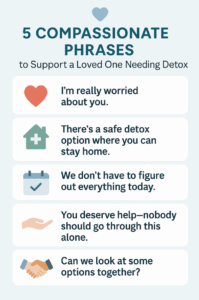💬 Introduction: When Words Feel Impossible
No one prepares you for this moment—the one where you realize your child, spouse, or sibling might need medical help to stop using drugs or alcohol. You love them. You want them safe. But what do you say? And how do you say it without pushing them away?
These are questions we hear every day at Prosperous Health. You’re not a clinician, and you shouldn’t have to be. But with the right words, you can open the door to change. And if you’re exploring Outpatient Detoxification, you’re already taking a powerful step forward.
1. Lead with Care, Not Control
Conversations about addiction can quickly turn into arguments if the person you’re speaking to feels accused, cornered, or misunderstood. That’s why the most powerful thing you can offer at the start is care.
Instead of saying:
“You need to stop this now.”
Try:
“I’m really scared for your safety, and I care about you more than anything.”
This subtle shift says, “I’m here with you,” not “I’m trying to fix you.”
Outpatient detox is a deeply personal step. It’s often met with fear or shame. Framing the conversation with warmth and humility helps your loved one feel seen—not shamed.
2. Use Simple, Calm Language
When someone is in crisis or denial, their emotional filter is already overloaded. Big words and complex explanations can feel overwhelming. Keep your message short, kind, and concrete.
Instead of saying:
“You need medical stabilization and a safe tapering protocol.”
Try:
“There’s a program where doctors help you detox safely—without staying overnight.”
At Prosperous Health, our Outpatient Detox Program is designed for people who want medical support but still need to stay close to work, home, or family. Explaining detox in this way makes it feel less scary—and more doable.
3. Normalize Detox as a Starting Point
Most people with substance use issues don’t wake up one day ready for treatment. For many, the idea of “getting help” feels like a giant leap.
So shift the focus. Instead of “fixing everything,” frame detox as the first small step toward feeling better.
You might say:
“You don’t have to figure it all out right now. Detox is just the first step so your body can begin to heal.”
Outpatient detox often works best for those who aren’t ready to commit to residential treatment—or who can’t step away from daily responsibilities. If your loved one values autonomy, this can be a game-changing way to frame the option.
4. Be Honest—But Keep the Hope Alive
Addiction is serious. It puts lives in danger. You know this—but so does your loved one, even if they won’t admit it out loud.
Avoid sugarcoating. But don’t paint a hopeless picture either.
Say something like:
“I know this has been hard on you—and on us. I don’t have all the answers, but I know there are people who can help. And I believe you deserve that help.”
This approach tells the truth while still believing in their future. It communicates that detox isn’t a punishment—it’s protection. That matters.
5. Offer Choices, Not Ultimatums
The instinct to issue an ultimatum (“Get help or move out!”) often comes from fear. But in most cases, fear pushes people further into denial or retreat.
A better approach? Offer choices. Build a bridge, not a cliff.
You could say:
“Would you be willing to look at some options with me? We can talk to someone, just to get information. No pressure.”
If they say no, you’ve still planted a seed. And you’ve modeled respect—something your loved one may not feel much of right now. You can also let them know that Prosperous Health offers private consultations and that you’re willing to go with them or support them behind the scenes.
🧠 Conclusion: You Don’t Have to Get It Perfect—Just Be Present
The fact that you’re reading this already says something powerful: You care enough to get it right.
You may not have the perfect script. But by showing up with love, clarity, and trusted support options, you’ve done something deeply important. You’ve helped keep the door open.
And that might be the first step toward healing.
🌱 Curious about your options? Talk to us today.
You don’t need to convince them alone. If you’re thinking about outpatient detox, start with a gentle conversation—and let us help guide the rest.

